This is an archive of news stories and research from the National Union of Public and General Employees. Please see our new site - https://nupge.ca - for the most current information.
Ben Powless is Mohawk from Six Nations in Ontario. He is currently studying Human Rights, Indigenous and Environmental Studies at Carleton University in Ottawa. The National Union sponsored Ben to attend the 2009 World Social Forum in Belem, Brazil, January 24 to February 2.
 “I arrived in Brazil on January 23rd. From the 24th to the 26th, I took part in a training undertaken by SONIA and Tebtebba, the former being a women’s rights group based out of Italy, the latter an Indigenous organization from the Philippines very active internationally. This training was deliberately set up to attract a number of international Indigenous youth participants who could attend before the actual WSF.
“I arrived in Brazil on January 23rd. From the 24th to the 26th, I took part in a training undertaken by SONIA and Tebtebba, the former being a women’s rights group based out of Italy, the latter an Indigenous organization from the Philippines very active internationally. This training was deliberately set up to attract a number of international Indigenous youth participants who could attend before the actual WSF.
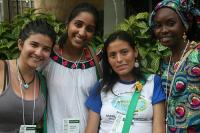 “The first day tackled the United Nations Declaration on the Rights of Indigenous Peoples (UNDRIP), explaining first the history of Indigenous engagement at the international level. In the afternoon, two further discussions were held, the first being about the UN Framework Convention on Climate Change (UNFCCC) of which a number of Indigenous Peoples had participated for the past number of years.
“The first day tackled the United Nations Declaration on the Rights of Indigenous Peoples (UNDRIP), explaining first the history of Indigenous engagement at the international level. In the afternoon, two further discussions were held, the first being about the UN Framework Convention on Climate Change (UNFCCC) of which a number of Indigenous Peoples had participated for the past number of years.
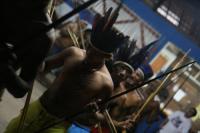 “More clarification was given to some of the proposed solutions to climate change, including the scheme called Reduced Emissions from Deforestation and Degradation, or REDD, which sought to protect forests through the application of market forces. This was highlighted as a particular threat for Indigenous Peoples, who had already seen many of their territories threatened and degraded under other proposed solutions to climate change, such as biofuels.
“More clarification was given to some of the proposed solutions to climate change, including the scheme called Reduced Emissions from Deforestation and Degradation, or REDD, which sought to protect forests through the application of market forces. This was highlighted as a particular threat for Indigenous Peoples, who had already seen many of their territories threatened and degraded under other proposed solutions to climate change, such as biofuels.
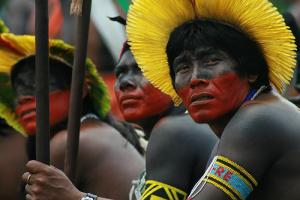 “The UN Convention on Biological Diversity (CBD) is another United Nations treaty body that worked on issues surrounding biodiversity. Indigenous Peoples had a special role within the CBD, special funding, and a relevant working group. There were many questions about how to actually make this Convention useful, for example, to protect a species that Indigenous groups felt was threatened.
“The UN Convention on Biological Diversity (CBD) is another United Nations treaty body that worked on issues surrounding biodiversity. Indigenous Peoples had a special role within the CBD, special funding, and a relevant working group. There were many questions about how to actually make this Convention useful, for example, to protect a species that Indigenous groups felt was threatened.
“The final day of the Indigenous youth trainings was spent trying to identify a number of issues that some of the representatives attending could work on together. It was identified that much of this information needed to be transmitted back to the communities, and translated into local languages. This would be of great service to Indigenous communities and young people.
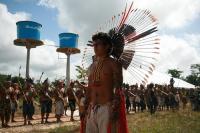 “At the WSF opening assemblies Indigenous Amazonian groups performed their welcoming protocols, while thirty minutes was given to allow statements from other Indigenous participants from around the world.
“At the WSF opening assemblies Indigenous Amazonian groups performed their welcoming protocols, while thirty minutes was given to allow statements from other Indigenous participants from around the world.
“The march that evening ended up gathering an estimated 50,000 people for a few hours through the streets of downtown Belem. I had a meeting with a number of environmental, civil society and a few Indigenous organizations aboard a docked boat that night to discuss plans for the forum, and how each group planned to use the forum.
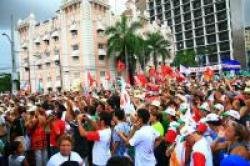 “I was asked to take part on a panel that was a continuation of the first discussion, this talk focused on critically assessing the role of Indigenous Peoples within the WSF. I was also asked to present at a discussion on the implementation of the UN Declaration on the Rights of Indigenous Peoples. The session was attended by many of the youth from the training, some representatives from the Brazilian Amazon, some other Indigenous Peoples and general participants. I gave a brief discussion on the indigenous rights violations that are resulting and will result from climate change, as well as the concerns around a number of plans to deal with climate change that do not take Indigenous rights into account.
“I was asked to take part on a panel that was a continuation of the first discussion, this talk focused on critically assessing the role of Indigenous Peoples within the WSF. I was also asked to present at a discussion on the implementation of the UN Declaration on the Rights of Indigenous Peoples. The session was attended by many of the youth from the training, some representatives from the Brazilian Amazon, some other Indigenous Peoples and general participants. I gave a brief discussion on the indigenous rights violations that are resulting and will result from climate change, as well as the concerns around a number of plans to deal with climate change that do not take Indigenous rights into account.
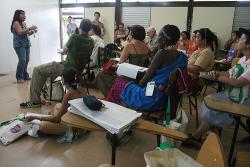 “Discussion on Climate Justice and Indigenous Peoples tackled a number of issues, with presenters from Brazil, a chief from the Amazon, a group talking about carbon trading, a Nigerian Indigenous leader talking about oil and gas in their lands, the director of the IEN weaving all of the issues together and talking about climate justice as a framework, and myself giving a presentation about the Tar Sands in Alberta, talking about the ecological devastation and the devastation of Indigenous lives and livelihoods concurrently.
“Discussion on Climate Justice and Indigenous Peoples tackled a number of issues, with presenters from Brazil, a chief from the Amazon, a group talking about carbon trading, a Nigerian Indigenous leader talking about oil and gas in their lands, the director of the IEN weaving all of the issues together and talking about climate justice as a framework, and myself giving a presentation about the Tar Sands in Alberta, talking about the ecological devastation and the devastation of Indigenous lives and livelihoods concurrently.
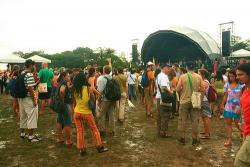 “Finally a workshop entitled 'Dialogue between Indigenous Peoples and Environmentalists’ was perhaps one of the most useful sessions of the conference for our purposes, garnering the participation of perhaps two dozen Indigenous participants from all around the world, and even more ‘environmentalists.’"
“Finally a workshop entitled 'Dialogue between Indigenous Peoples and Environmentalists’ was perhaps one of the most useful sessions of the conference for our purposes, garnering the participation of perhaps two dozen Indigenous participants from all around the world, and even more ‘environmentalists.’"
The above text is taken from Ben's report which can be downloaded by clicking on the report cover above.
NUPGE
The National Union of Public and General Employees (NUPGE) is one of Canada's largest labour organizations with over 340,000 members. Our mission is to improve the lives of working families and to build a stronger Canada by ensuring our common wealth is used for the common good. NUPGE
